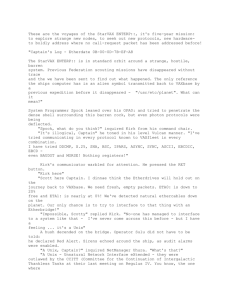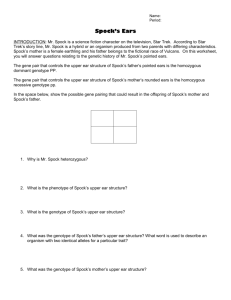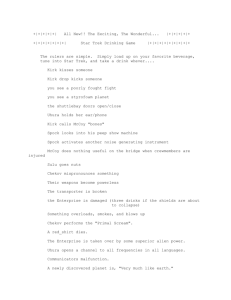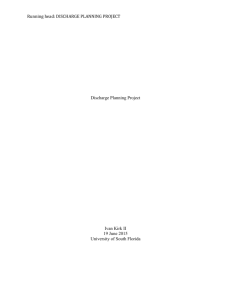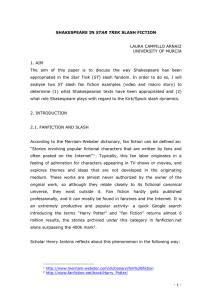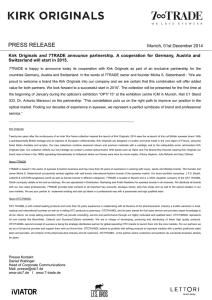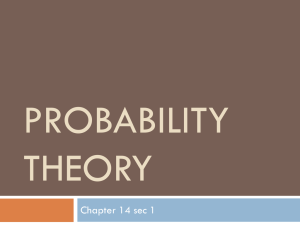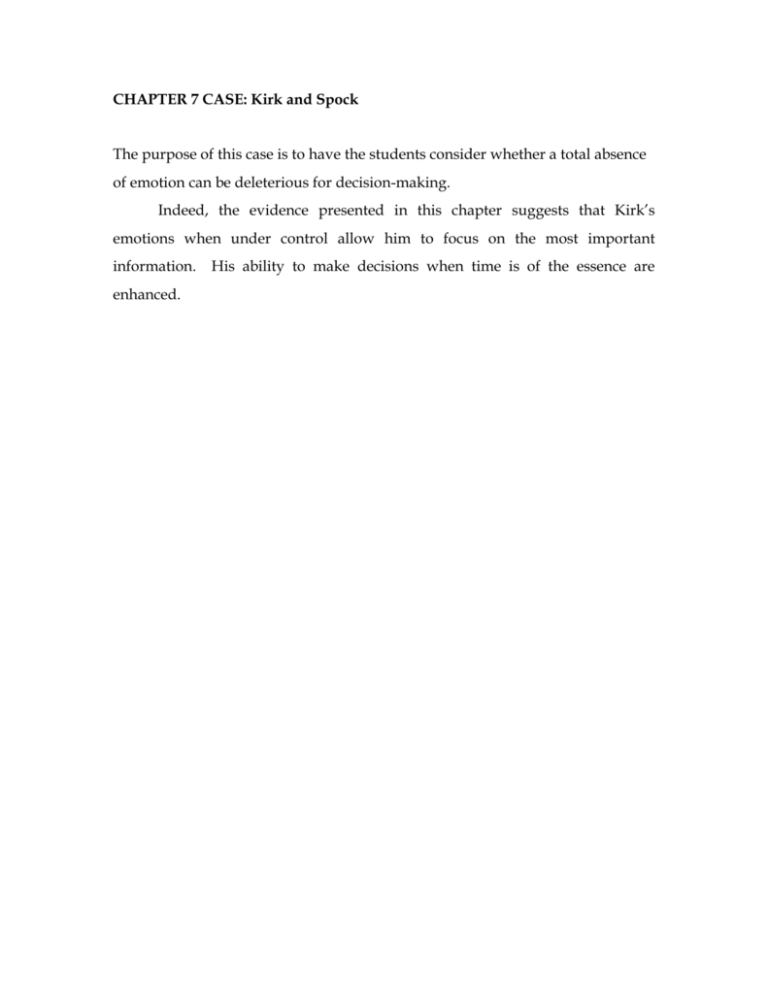
CHAPTER 7 CASE: Kirk and Spock
The purpose of this case is to have the students consider whether a total absence
of emotion can be deleterious for decision-making.
Indeed, the evidence presented in this chapter suggests that Kirk’s
emotions when under control allow him to focus on the most important
information.
enhanced.
His ability to make decisions when time is of the essence are
2|Page
STUDENT CASE: Kirk and Spock
How do we characterize a “rational” person? Is he a cool and unemotional
individual who bases decisions purely on logic? Let’s consider characters from
the popular television and movie series Star Trek. The first episode of the show
aired on NBC on September 8, 1966. Though the original series was canceled
after only three seasons, spin-offs and movies have kept the characters alive for
fans of the show. The episodes were set in the 23rd century and told the story of
the experiences of the crew of the starship Enterprise.
Two primary characters won the attention of many and they continue to
be part of popular culture. Mr. Spock, half-Vulcan, is portrayed as a strictly
rational thinker who thoroughly considers every piece of information. Vulcans,
as a species, are known to suppress emotions and prize logic thinking. Spock,
who is the Enterprise’s second in command, fully analyzes every decision at
hand, but sometimes seems to get too caught up in the details. In contrast,
Captain Kirk is purely human and likely to respond emotionally in difficult
situations. At the same time, Kirk is generally thought to be a good decisionmaker. He is the captain of the Enterprise, after all.
As an example of the characters’ natures, consider the events of a popular
episode, “The Galileo Seven,” which originally aired on January 6, 1967. While
on the way to deliver vaccines for a plague, the Enterprise stops to investigate a
strange phenomenon. Because they have a few days before they are scheduled to
deliver the vaccines, Kirk sends Spock and a team aboard a shuttlecraft, the
Galileo, to explore further. The two vessels soon lose contact due to interference
by a phenomenon, which appears to be some type of quasar. In the end, Spock
saves the shuttlecraft team by making a risky decision to lift off the planet on
which they had landed without sufficient power to remain in orbit.
The
Enterprise crew saw a flare from the shuttlecraft and returned in time to save
©2010 Cengage Learning. All Rights Reserved. May not be scanned, copied or
duplicated, or posted to a publicly available website, in whole or in part.
3|Page
them. Here is an excerpt of the dialogue between Kirk and Spock after the
rescue:
Kirk: Uh, Mr. Spock, there's really something I don't understand about all
of this. And maybe you can explain it to me. Logically, of course. When
you jettisoned the fuel and ignited it, you knew there was virtually no
chance of it being seen, yet you did it anyhow. That would seem to be an
act of desperation.
Spock: Quite correct.
Kirk: We all know, and I'm sure the doctor agrees, that desperation is a
highly emotional state of mind. How does your well-known logic explain
that?
Spock: Quite simply, Captain. I examined the problem from all angles,
and it was plainly hopeless. Logic informed me that, under the
circumstances, the only possible action would have to be one of
desperation. Logical decision, logically arrived at.
Kirk: Aha, ha ha. I see. You mean you reasoned that it was time for an
emotional outburst.
Spock: Well, I... wouldn't put it in exactly those terms, Captain, but...those
are essentially the facts.
Kirk: You're not going to admit that for the first time in your life, you
committed a purely human, emotional act?
Spock: No, sir.
Kirk: Mr. Spock, you're a stubborn man.
Spock: Yes, sir.
Do you think Spock is purely logical, as he is typically portrayed? Can emotion
and logic be separated, as personified in the characters of Kirk and Spock? Do
Kirk’s emotions have a positive side?
©2010 Cengage Learning. All Rights Reserved. May not be scanned, copied or
duplicated, or posted to a publicly available website, in whole or in part.


